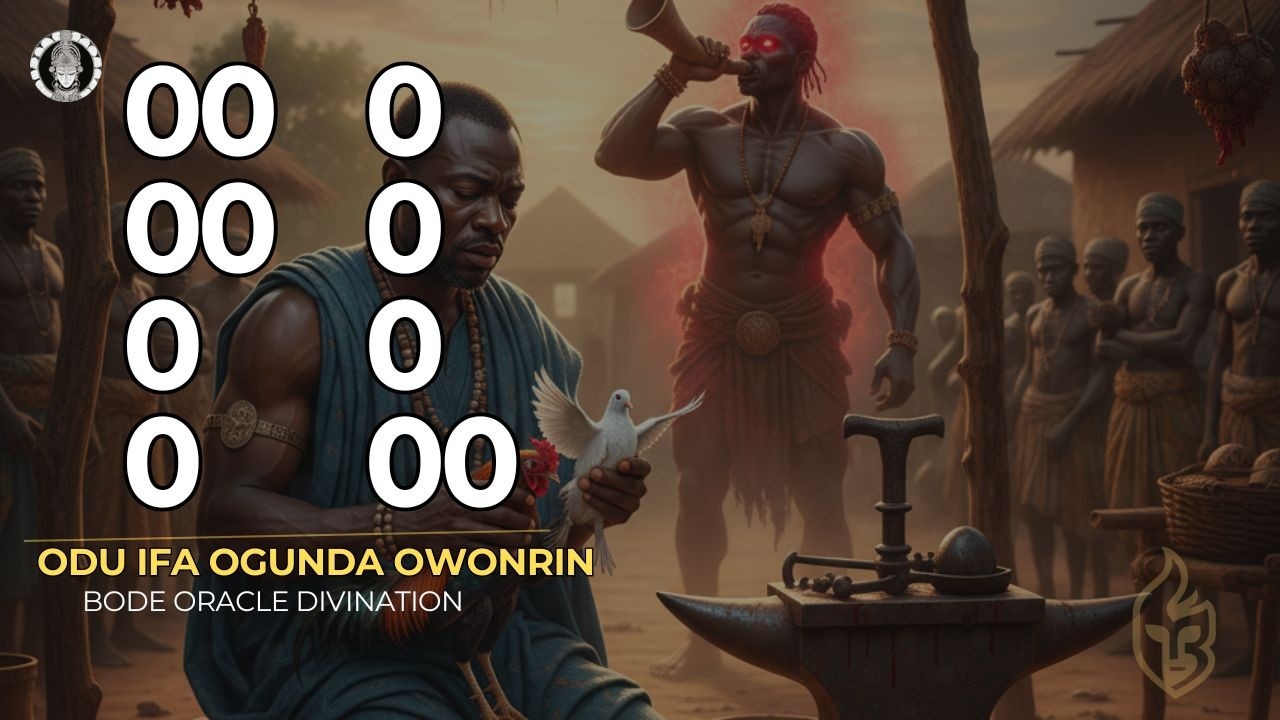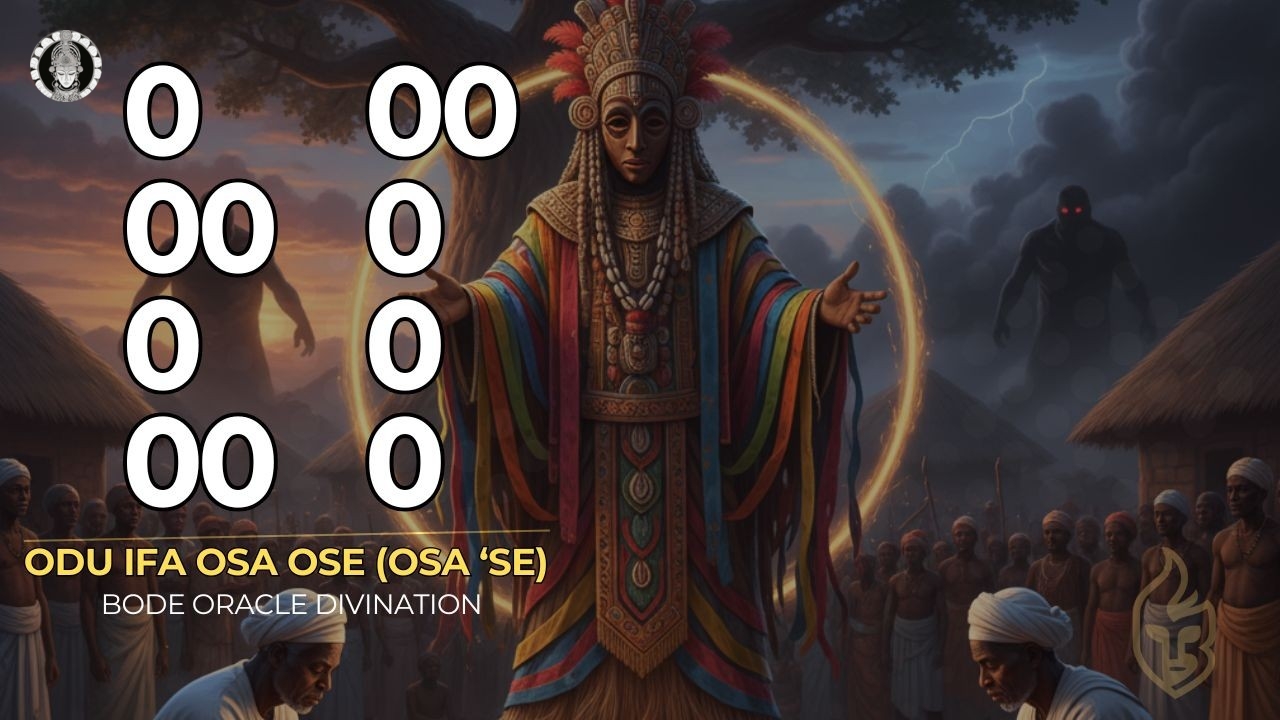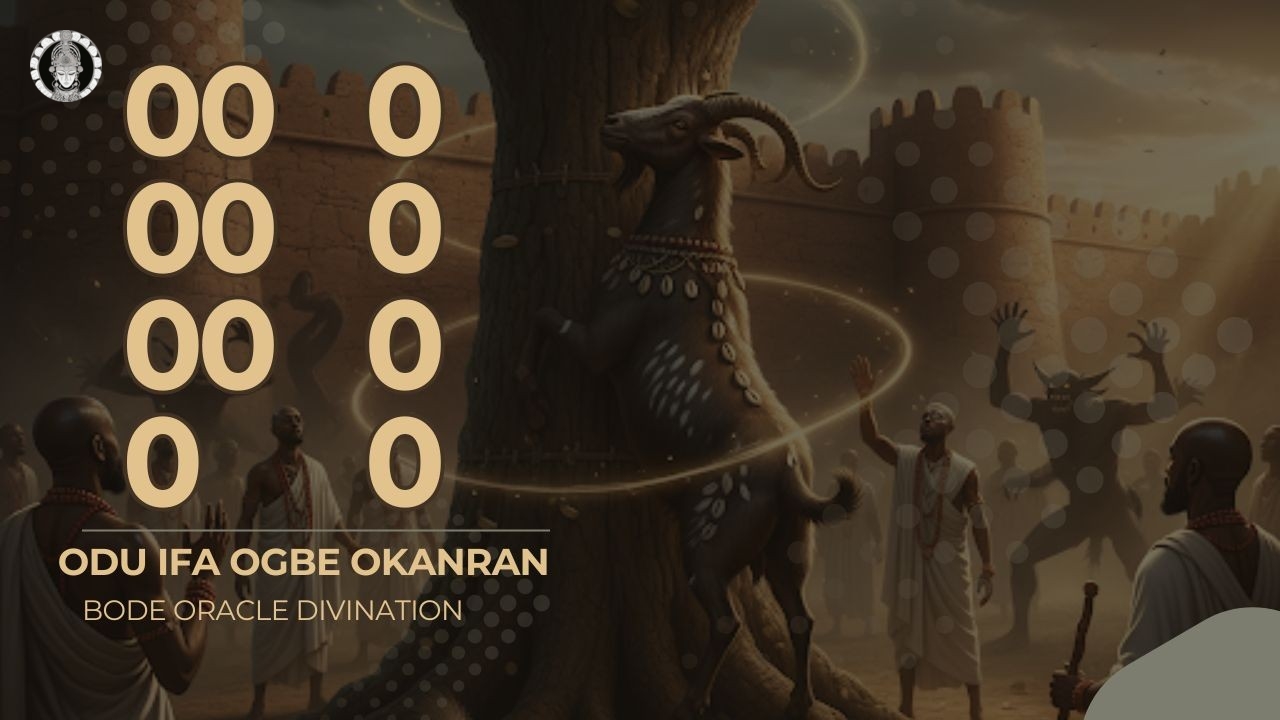Introduction to Odu Ifa Ogbe Okanran (Ogbe Kanran)
Odu Ifa Ogbe Okanran, also known as Ogbe Kanran, stands among the most transformative of the 256 sacred divination signs in the Ifa corpus. This powerful Odu addresses the fundamental human desires for fertility and offspring, protection from spiritual attacks, the transformation needed to achieve one's destiny, and the collective welfare of communities. Through the wisdom of Ogbe Okanran, we learn that sharing and generosity create the foundation for individual and communal blessings.
The divinations within Ogbe Okanran speak to universal human experiences: the pain of childlessness and the joy of fertility, the struggle against unseen enemies, the courage required to change one's identity to fulfill destiny, and the spiritual technologies that protect entire populations. Each story serves as both practical guidance and profound spiritual instruction, demonstrating how faith combined with proper sacrifice transforms impossible situations into testimonies of divine intervention. For comprehensive understanding of Ifa divination as a knowledge system, explore scholarly documentation of this ancient wisdom tradition.
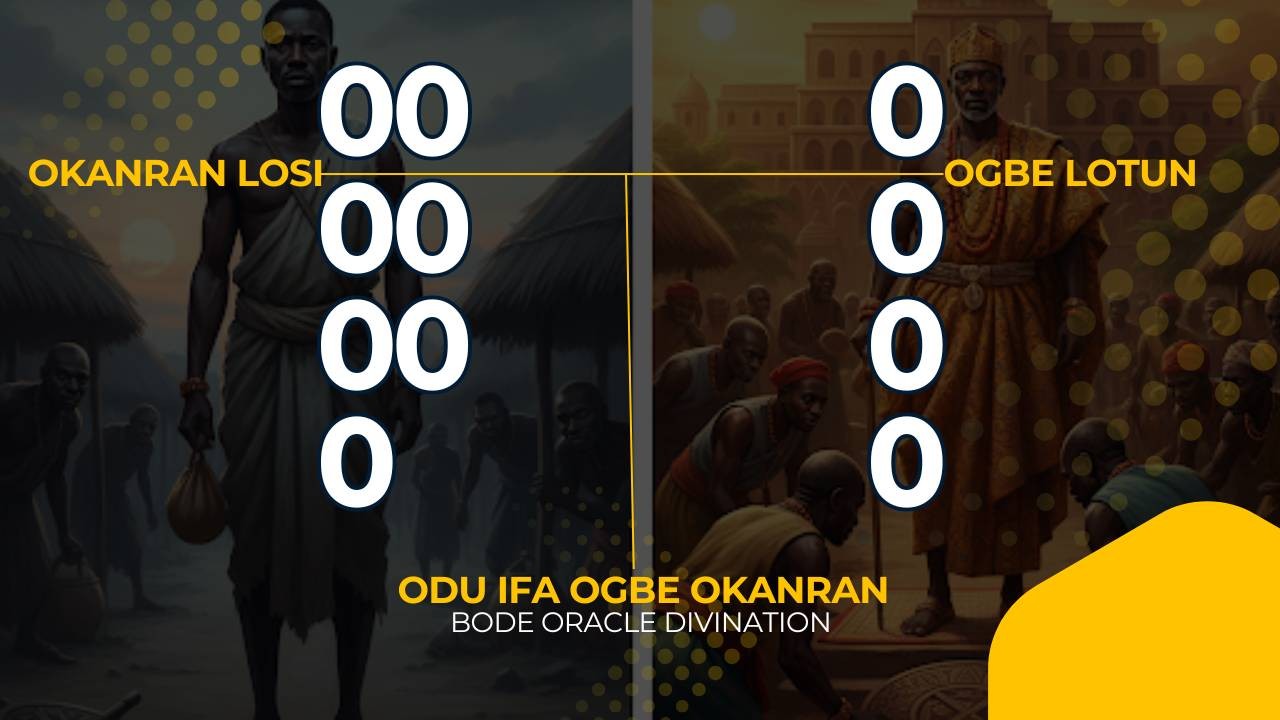
Ifa Divination for Awujẹ: The Blessing of Fertility and Fruitfulness
Understanding the Pain of Childlessness
This divination from Ogbe Okanran addresses one of the most profound sorrows a person can experience—the inability to have children. Ifa reveals that the person receiving this Odu has been longing for offspring, experiencing the emotional and spiritual pain that comes with unfulfilled fertility. However, Ifa brings a message of hope: through proper sacrifice and undertaking a specific journey, not only will children come, but abundance of children will manifest.
The divination specifically connects fertility with travel and relocation. Awujẹ was preparing to go to the farm of Alero, representing a significant journey or change of environment. This teaches an important principle: sometimes the manifestation of our blessings requires us to move—physically, emotionally, or spiritually—from where we currently are to where destiny can fully unfold.
The Sacred Verse in Yoruba
Ká bù'jẹ, ká bù tà
A d'Ífá fún Áwújẹ
Tí ó ńlọ oko áléró l'ódún
Ó ní rírú ẹbọ níí gbe ni
Áìrú ebo kìí gbè eniyán
English Translation
Let us share food,
Let us share trade.
This was the Ifa cast for Awujẹ,
Who is going to the farm of Alero with intentions that year.
It is said that the offerings will sustain us;
A lack of offerings cannot sustain a person.
The Philosophy of Sharing
The opening lines of this verse—"Let us share food, let us share trade"—establish a fundamental principle in Yoruba spirituality: prosperity flows through generosity and community mindedness. This is not merely about material sharing but represents a spiritual posture of openness and reciprocity. When we approach life with a sharing mentality rather than a hoarding mentality, we align ourselves with the natural flow of abundance in the universe.
In the context of fertility, this principle takes on deep meaning. Children are the ultimate form of sharing—we share our bodies, our resources, our love, and our legacy with them. Awujẹ's willingness to make offerings demonstrates this spirit of sharing extended into the spiritual realm. She shares with the divine forces, and in return, receives the blessing of multiple children with whom to share her life.
The Principle of Spiritual Sustenance
The verse makes a critical distinction: offerings sustain us, while lack of offerings cannot sustain a person. This teaches that physical efforts alone—even going to the farm, working hard, doing everything humanly possible—are insufficient without spiritual support. Awujẹ could have gone to Alero's farm without making offerings, but the result would have been different. The offerings create spiritual sustenance that carries us through challenges and opens doors that human effort alone cannot open.
Awujẹ's Journey to Blessing
The story tells us that Awujẹ "put two and three together"—a Yoruba expression meaning she contemplated deeply, using her intelligence and spiritual sensitivity to recognize she needed divine guidance. She went to the Ifa priest with two specific questions: How will I have children? Will this journey be prosperous? This demonstrates wisdom—she understood that fertility and her planned journey were spiritually connected, and both needed divine blessing.
When told to make offerings, she complied without hesitation or doubt. The text emphasizes this compliance: "she made the offerings." This simple statement carries profound meaning. Many people receive spiritual guidance but fail to act on it, or act half-heartedly, or delay. Awujẹ's immediate compliance demonstrates the faith that activates divine intervention.
The Manifestation of Multiple Blessings
The result of Awujẹ's obedience exceeded her request. She didn't just have one child; she became "very fruitful" with multiple offspring. This illustrates a principle throughout Ifa: when we comply with spiritual guidance, blessings often exceed our expectations. We ask for sufficiency; God gives abundance. We seek relief; God gives transformation. Awujẹ's barrenness transformed into such fertility that her story became one of the divination verses passed down through generations.
The Concluding Verse
Ko pé o, ko jina
Ẹ wá bá wa laarin ọmọ
Áárin ọmọ làá bá ní lẹsẹ Ọbárìṣà
Translation: It is not long; it is not far. Come join us among the children. We will thrive among the children of Obàriṣà.
This conclusion celebrates communal joy—Awujẹ's blessing becomes the community's blessing. The phrase "children of Obàriṣà" connects individual fertility to spiritual lineage, reminding us that all children are ultimately spiritual gifts, regardless of biology. For deeper understanding of Yoruba cosmology and spiritual philosophy, consult UNESCO's documentation on Ifa of the Yoruba People.
Modern Application
For contemporary individuals receiving this divination, the message remains powerful whether one seeks biological children, spiritual children (students, mentees), creative children (projects, businesses), or any form of fruitfulness. The principles are constant: make proper offerings, be willing to undertake necessary journeys or changes, maintain a spirit of sharing and generosity, and have faith that compliance with spiritual guidance will manifest blessings that exceed expectations.
Ifa Divination for Ọró: Transforming Into Spiritual Immunity
The Reality of Spiritual Warfare
This divination from Ogbe Okanran confronts a reality that many experience but few openly discuss: spiritual attacks from witches and malevolent forces. Ifa reveals that Ọró was surrounded by enemies who used occult powers to prevent him from finding peace or experiencing any ease in life. This represents not just external opposition but coordinated spiritual warfare designed to keep a person in perpetual struggle and misery.
The divination uses the specific term "ẹlẹyẹ" (witches) to identify the source of Ọró's troubles. In Yoruba cosmology, ẹlẹyẹ represents a complex spiritual reality—these are forces that can operate through jealous individuals, ancestral curses, or independent spiritual entities. What makes them particularly dangerous is their ability to attack the victim's peace of mind, health, and spiritual clarity, creating a state where nothing seems to work despite best efforts.
The Sacred Verse in Yoruba
Ọtapẹtẹmoso
A d'Ifá fún ọró
Recognizing Spiritual Attack
The key phrase in this divination—"they do not allow him to see the solutions to his problems" (wọn kò jẹ ki ó rí ojútùú ayé ré)—describes a common symptom of spiritual attack. It's not that solutions don't exist; it's that the person cannot see them. Their spiritual vision is clouded, their judgment compromised, their intuition blocked. This creates a frustrating cycle where every attempt at improvement fails, not due to lack of effort but due to spiritual interference.
Similarly, "they do not allow him to be at ease" (wọn kò jẹ kí ó nilaari) describes the psychological and emotional toll of constant spiritual attack. The person experiences perpetual anxiety, restlessness, disturbed sleep, and an inability to find peace even in moments that should be restful. This is spiritual harassment designed to wear down the victim's resistance and hope.
The Transformative Medicine
Ifa prescribed a powerful spiritual preparation for Ọró: traditional corn pap (ẹkọ fifọ) mixed with the abéré plant and red pepper (ata pupa), all spiritually prepared and consumed. This wasn't merely herbal medicine but spiritual transformation. The divination reveals that after consuming this preparation, "the witches could no longer approach him" (áwọn ẹlẹyẹ kò lé dé òdọ ré mó).
Understanding the Oro Tree Transformation
The most profound aspect of this divination is the explanation of how the Oro tree gained its protective properties. The text reveals that the thorns/fangs of the Oro tree (abẹrẹ ọjó yẹn ni ègún tí ó wà ní ara ọró) came from the abéré plant that Ọró consumed. The sap that emerges from the tree (ẹkọ ọjó náà ni ó di oje ara ré) came from the corn pap. The burning, irritating quality that makes the tree's sap dangerous to eyes (ata ọjó náà ni ó wà lára oje rè ti kò fi gbodo dá si ojú) came from the red pepper.
This teaches that spiritual transformation is not temporary—it becomes inherent to your nature. Just as these qualities permanently became part of the Oro tree's essence, so too did Ọró's spiritual consumption of the medicine permanently transform his spiritual nature. He didn't just receive temporary protection; he became intrinsically toxic to his enemies. His very spiritual essence repelled witchcraft.
The Symbolism of Each Ingredient
The corn pap (ẹkọ) represents sustenance and life force. In Yoruba culture, ẹkọ is a staple food that nourishes and sustains life. Spiritually prepared, it becomes the life force that feeds one's spiritual immunity.
The abéré plant, with its sharp thorns, represents defensive power. Just as its thorns protect it from being consumed by animals, so too does it grant the person consuming it spiritual thorns that repel spiritual predators.
Red pepper (ata pupa) brings fire and intensity. Its burning quality doesn't just add heat but represents spiritual aggression against enemies—making you not just defended but actively dangerous to those who would attack you.
Victory Through Transformation
The divination concludes by emphasizing that Ọró achieved complete victory over the witches (tí ọró sí ṣégun àwọn ẹlẹyẹ pátápátá). This wasn't a temporary reprieve or partial protection—it was absolute triumph. The strategy wasn't to fight the witches directly but to transform oneself into something they cannot touch. This represents profound spiritual wisdom: sometimes the most effective defense is not aggression but transformation into a state that naturally repels attack.
Modern Application and Caution
For contemporary individuals receiving this divination, the principle remains valid: when experiencing persistent obstacles, blocked progress, constant anxiety, or the sense that unseen forces oppose you, spiritual intervention may be necessary. However, this preparation should only be undertaken under the guidance of a qualified Babalawo who can properly prepare the medicine with appropriate incantations and spiritual protocols. The power comes not just from the physical ingredients but from the spiritual knowledge that accompanies preparation. To understand the cultural context of Yoruba spiritual practices, explore UNESCO's recognition of the Ifa divination system.
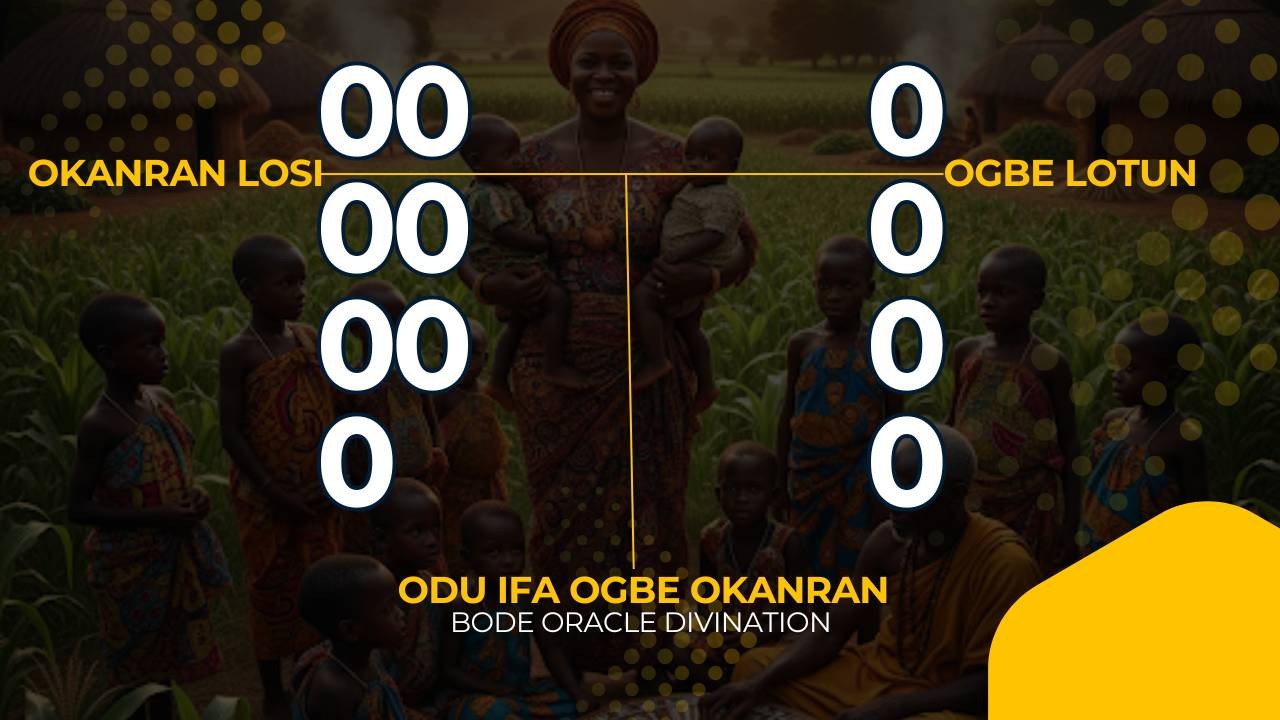
Ifa Divination for Ọlágbégí: The Power of Name Transformation
When Your Name Becomes Your Obstacle
This divination from Ogbe Okanran addresses a unique spiritual challenge: when one's birth name itself attracts jealousy, opposition, and spiritual attack that prevents destiny fulfillment. Ọlágbégí's name means "one who is honored" or "one who will be great," but this very name became the focal point for his enemies' attacks. They used his name as a weapon against him, saying mockingly that despite his name promising greatness, he had achieved nothing.
This represents a profound spiritual reality: sometimes the very things that should be blessings—our names, our talents, our birthright—become targets for those who oppose our destiny. In Yoruba spirituality, names carry spiritual power and prophetic significance. When enemies know your name and its meaning, they can use that knowledge to work against you spiritually.
The Sacred Verse in Yoruba
Ido apata abidí jẹjẹrẹ
A dIfá fún Ọlágbégi
Ti ńlọ Òkitì Ẹfón
Ti ńlọ rèé bá wọn mílẹ ibùdo
English Translation
The stone at the edge is a shield.
This was the Ifa cast for Ọlágbégi,
Who is going to Òkitì Ẹfón,
Who is going to meet them at the place of settlement.
The Stone as Shield Metaphor
The opening line—"The stone at the edge is a shield" (Ido apata abidí jẹjẹrẹ)—carries deep symbolic meaning. A stone at the edge marks boundaries and provides protection. It represents the defensive strategy that Ọlágbégí would employ: creating distance (the edge/boundary) between himself and his enemies, using that separation as protection (the shield). This metaphor foreshadows the solution: relocation and name change creating a boundary his enemies cannot cross.
The Strategy of Temporary Identity Shift
Ifa's prescription to Ọlágbégí was radical but effective: leave your current location, go to a new town, change your name temporarily, and make the necessary offerings. The genius of this strategy is that it breaks the spiritual connection enemies have established with your identity. When they try to attack "Ọlágbégí," you are no longer answering to that name in that location—you are "Ọlájùwéré" in Òkitì Ẹfón. Their spiritual attacks cannot find their target.
Critically, Ifa promised that once Ọlágbégí achieved greatness under his new name, he could reclaim his birth name. This teaches that the name change is strategic, not permanent. It's a spiritual tactic to allow destiny to manifest without interference. Once you've achieved your destiny and are established in greatness, you can reclaim your identity—but now from a position of power where enemies can no longer use it against you.
The Transformation Journey
The story details Ọlágbégí's compliance and success. He made the offerings, changed his name to Ọlájùwéré (which means "character/honor is beneficial"), and relocated to Òkitì Ẹfón. In this new environment, free from the spiritual attacks tied to his old identity, "he began to flourish" (báyìí ni ó bèrè si rí ṣe). Everything prospered (gbogbo ńkan rẹ ńdára), and he became a great person (tí ó si di eni ńla).
This demonstrates a crucial principle: sometimes our environment and the spiritual atmosphere surrounding our known identity create such resistance that we cannot progress, regardless of our talents or efforts. Changing location and identity breaks that resistance, allowing destiny to unfold naturally.
Gratitude and Divine Order
When success came, Ọlágbégí maintained proper spiritual protocol: "He thanked the diviners, and the diviners thanked Ifa, Ifa thanked Elédùmarè, the King of Heaven" (Ó nyin Awo, Awo nyin Ifá, Ifá nyin Elédùmarè ọba l'órun). This chain of gratitude demonstrates the proper spiritual order—blessings flow from the Supreme Being (Elédùmarè) through Ifa to the diviners to the person, and gratitude flows back through the same channels.
The Birth of a Dynasty
When Ọlágbégí arrived at Òkitì Ẹfón and was asked his name, he responded "Ọlájùwéré." The people honored him with land and farmland, and he settled there permanently. The divination reveals that "he was the one who remained a king in the land of Ọwọ" (Òun ló wá kù ti ńjẹ ọba ni òde Ọwọ). This shows that Ọlágbégí eventually became the Olowo (king) of Owo—a position his descendants continue to hold to this day.
This historical validation is significant. Ogbe Okanran isn't just spiritual theory—it describes the actual founding of a royal dynasty that exists in contemporary Nigeria. The Olowo of Owo traces his lineage to this divination story, demonstrating that Ifa's promises manifest in historical reality when guidance is followed completely.
The Warning About Substantial Sacrifice
The divination concludes with emphasis: "Ifa advised that this person should make offerings and ensure to make substantial offerings as instructed by the diviners and heed to this sacrifice" (Ifá pé ẹbọ ni ki ó rú, ki ó si ma fi eti pàlábá ẹbọ tí awon awo bá ni ki ó rú). The phrase "fi eti pàlábá" (pay serious attention) indicates that this is not a casual suggestion but a critical instruction. Half measures will not produce full results.
Modern Application
For contemporary individuals receiving this divination, the message remains powerful. If you find that despite your talents and efforts, you cannot progress; if your name or identity seems to attract unusual opposition; if you feel spiritually blocked in your current environment—consider whether relocation and strategic rebranding might be necessary. This applies to physical relocation, career changes, or even online identity in the digital age. Sometimes the best strategy is not to fight where you are but to establish yourself elsewhere, then return victorious. For scholarly analysis of Ifa divination methodology, consult research on algebraic characterization of Ifa divination codes.
Ifa Divination for Ife Ooye Lagbemoro: Collective Protection from Calamity
When Entire Communities Face Spiritual Crisis
This divination from Ogbe Okanran addresses the highest level of spiritual intervention: protecting an entire community or city from death, misfortune, and calamity. The ancient city of Ife—considered the spiritual and cultural birthplace of Yoruba civilization—was experiencing unprecedented suffering. Death (ikú), loss (òfò), and troubles (òràn) were ravaging the population, creating collective despair.
This represents situations where individual suffering has become communal crisis. When entire populations face epidemics, wars, economic collapse, or natural disasters, individual spiritual work is insufficient. Collective problems require collective spiritual solutions, performed at the community level with representatives acting on behalf of all.
The Sacred Verse in Yoruba
Àdán l'awo arà riri rá riri
Ògbigbì l'awo arà riri rá riri
A d'Ífá fún Ogbè
L'ójó ti ó ńlọ rèé kan ikú, kan ófò, kan òràn, ni Ifè Oòyè lagbèmoró.
English Translation
The transformation is the manifestation of the spirit.
The totality is the manifestation of the spirit.
This was the Ifa cast for Ogbè
On the day he went to confront death, misfortune, and distress, in Ife Oòyè Lagbemoro.
Understanding "Confronting" Spiritual Forces
The phrase "kan ikú, kan òfò, kan òràn" literally means "to touch/confront death, to touch/confront loss, to touch/confront trouble." The word "kan" carries the sense of making contact with something to neutralize it—like touching a live wire to ground it. This wasn't about fighting these forces but about creating spiritual contact that would redirect them away from the community.
The repetition of "arà riri rá riri" in the opening lines creates a rhythmic invocation that represents the totality and completeness of spiritual manifestation. When something manifests completely (ògbigbì), it becomes fully real and effective in the physical realm. This divination was calling for complete, total, and absolute protection—not partial relief.
The Prescribed Community Sacrifice
Ifa prescribed a specific protocol for Ife: sacrifice a large male goat (orúkọ ńlà kan), invoke all the Odu of Ifa into it (ki wọn ó pe iyé Ifá sì), take it to the city gates (ki wọn ó lọ rèé fi sẹnu odi ilú), and attach it to a large tree behind the city wall (Kí wọn kàn-àn mó ígí ńlá l ehin odi ilú).
The Spiritual Architecture of Protection
Every element of this sacrifice carries specific meaning. The male goat represents strength, vitality, and substitutionary power—it takes the place of the community in facing death and misfortune. Invoking all the Odu of Ifa into the goat loads it with the complete power and authority of the entire Ifa corpus—all 256 Odu, representing total spiritual coverage.
Placing it at the city gates creates a spiritual barrier at the entry points where calamity would enter. The gate is liminal space—the boundary between inside and outside, safety and danger, community and wilderness. Sacrificing at this threshold establishes spiritual protection exactly where it's needed most.
Attaching it to a large tree behind the wall adds permanence and grounding. Trees represent endurance, deep roots, and connection between earth and heaven. Binding the sacrifice to a tree makes the protection permanent and growing—the tree's life force continually energizes the protective barrier.
The Permanent Result
The text states explicitly: "From the day they made this offering, misfortune and untimely death, along with all other adversities, ceased to affect them" (Láti ọjọ ti wọn ti ṣe irúbọ yii ni òfò, ikú òjìji, pelu gbogbo ibi yooku kò ti ṣẹlé sí wọn mó nilu Ife lagbemoro). This wasn't temporary relief—it was permanent transformation of the spiritual atmosphere of the entire city.
The Origin of the Name "Ogbe Kanran"
The divination reveals how this Odu got its name. After the sacrifice proved effective, the people of Ife deliberated on what to call this Odu. They decided on "Ogbe-Kánrán" because "it went to confront (kan) death, confront loss, confront suffering, confront trouble in Ife Oòyè Lagbèmoró" (óun ló lọ rèè kan ikú, tó kan òfò, tò kan ìyà, tó kan òràn n'Ífẹ Oòyé Lagbèmoró).
This naming is significant—the Odu's name literally encodes its most important function: confronting and neutralizing collective calamity. Every time a diviner calls this name, they invoke this historical victory over death and misfortune.
Modern Application for Communities
For contemporary communities facing crisis—whether natural disasters, epidemics, violence, or economic collapse—this divination provides a template. Community leaders, traditional authorities, or spiritual representatives can consult Ifa and perform prescribed collective sacrifices on behalf of the entire population. The principle remains valid: collective problems require collective spiritual solutions, properly performed at community boundaries and entry points, creating permanent protective barriers when done correctly.
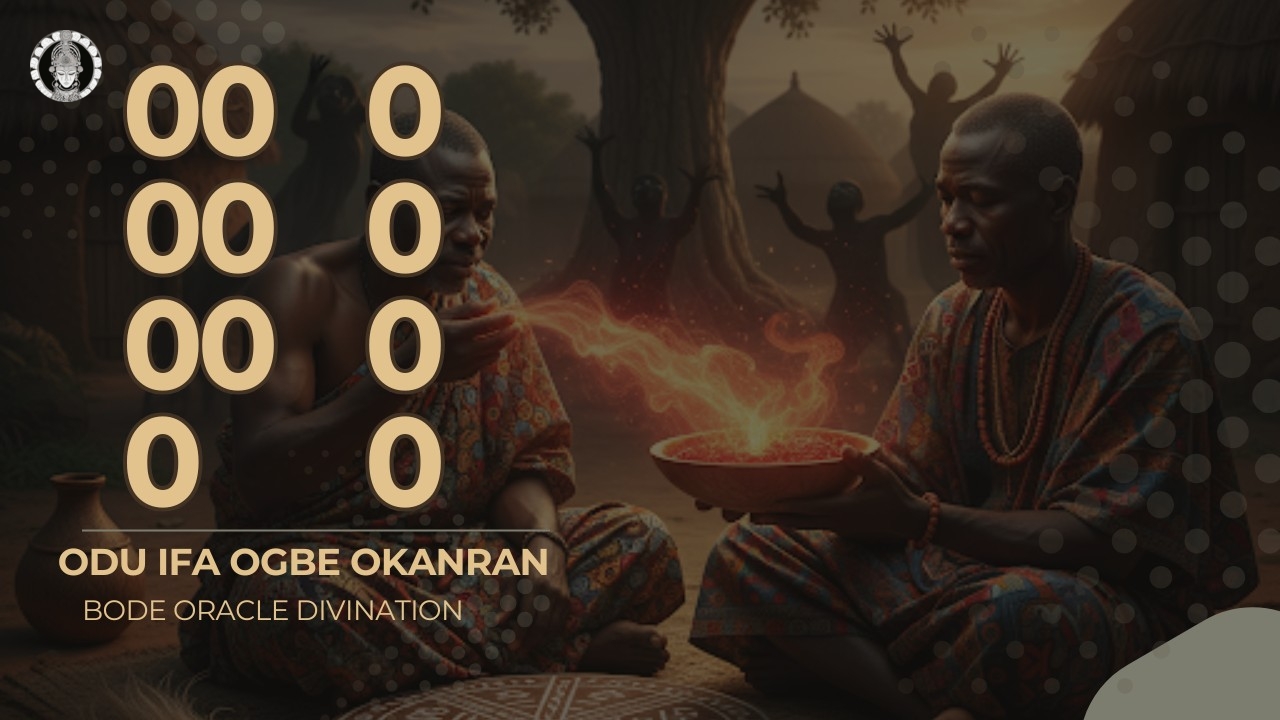
Core Spiritual Principles of Ogbe Okanran
The Principle of Sharing and Generosity
The opening verse of the first divination—"Let us share food, let us share trade"—establishes generosity as the foundation of prosperity in Ogbe Okanran. This Odu teaches that blessings multiply through sharing, not hoarding. Whether sharing resources, knowledge, opportunities, or spiritual wisdom, the act of giving creates the conditions for receiving. This applies to fertility (sharing life itself with offspring), community protection (sharing responsibility for collective welfare), and spiritual transformation (sharing one's journey to inspire others).
The Necessity of Offerings
Every divination in Ogbe Okanran emphasizes that offerings sustain while lack of offerings cannot sustain. This principle appears consistently: Awujẹ had to make offerings for fertility, Ọró had to make offerings for protection, Ọlágbégí had to make offerings for transformation, and Ife had to make offerings for community protection. The message is clear—spiritual sustenance comes through maintaining proper relationship with divine forces via sacrifice. Physical effort alone, no matter how diligent, is insufficient without spiritual support.
Transformation Over Confrontation
Ogbe Okanran teaches that the most effective strategy against opposition is often transformation rather than direct confrontation. Ọró didn't fight the witches—he transformed his spiritual nature to become toxic to them. Ọlágbégí didn't battle his enemies in his hometown—he transformed his identity and location, making their attacks irrelevant. This wisdom applies to many life situations: sometimes the solution isn't winning the fight but changing the game entirely.
The Power of Strategic Relocation
Both Awujẹ and Ọlágbégí achieved their destinies through strategic relocation. This teaches that sometimes our blessings are location-specific. The environment where we currently exist may not be the environment where our destiny can manifest. Spiritual wisdom includes knowing when to stay and fight versus when to move and flourish elsewhere. This applies to physical location, career environments, relationships, and any situation where the atmosphere prevents progress despite our efforts.
Collective Responsibility
The divination for Ife demonstrates that individual spirituality must sometimes scale to collective action. When entire communities face crisis, representatives must act on behalf of all, performing spiritual work that creates protective barriers benefiting everyone. This challenges the modern Western emphasis on purely individual spirituality, reminding us that we are part of communities whose spiritual health affects our individual wellbeing.
Faith Expressed Through Compliance
Throughout Ogbe Okanran, the pattern is consistent: those who complied with Ifa's prescriptions received blessings. Awujẹ complied—she became very fruitful. Ọró complied—he defeated the witches permanently. Ọlágbégí complied—he became a king. Ife complied—they gained permanent protection. Faith isn't merely mental agreement; it's demonstrated through obedient action. Knowledge of what to do is worthless without the commitment to actually do it.
The Permanence of Spiritual Transformation
When spiritual work is done properly, the results become permanent and inherent to one's nature. Ọró's spiritual consumption didn't give him temporary protection—it permanently transformed his spiritual essence, just as the Oro tree's toxic properties became permanent. This teaches that properly performed spiritual work doesn't require constant renewal; it creates lasting change that becomes part of who you are.
Additional Resources
Internal Links
- Complete Guide to Ogbe Okanran - Detailed information, taboos, and practices
- Ogbe Ogunda - Related Odu teachings
- Bode.ng Blog - Extensive collection of Ifa and Yoruba spirituality articles
- Complete Odu Ifa Directory
- Bode.ng - Access divination services and community
External Resources
- African Traditional Religions: Ifa Divination - Duquesne University
- Ifa Divination System - Wikipedia
- Ifa of the Yoruba People of Nigeria - UNESCO
- Algebraic Characterization of Ifa Main Divination Codes
- UNESCO Recognition of Ifa Divination System
- Opon Ifa - The Divination Tray
Connect With Us on Social Media
- BODE Oracle on TikTok
- BODE Oracle on YouTube
- BODE Oracle on Facebook
- BODE Oracle on X (Twitter)
- BODE Oracle on Pinterest
Visit Bode.ng to explore more divination teachings, participate in quizzes and polls, and connect with our community of practitioners and learners. Register today to access exclusive content and personalized guidance on your spiritual journey.
Frequently Asked Questions And Answers About Odu Ifa Ogbe Okanran (Ogbe Kanran)
Find answers to common questions about this sacred Odu Ifa and its divination teachings
Ogbe Okanran, also called Ogbe Kanran, is one of the 256 sacred Odu (divination signs) in the Ifa corpus. It carries powerful messages about fertility and childbearing, victory over witchcraft and enemies, name transformation for achieving greatness, and community protection from death and misfortune. This Odu teaches that through proper sacrifice and faith, barren women can become mothers, enemies can be defeated, and entire communities can be shielded from calamity.
The divination of Awujẹ in Ogbe Okanran specifically addresses childlessness and the desire for offspring. When a woman who has been unable to conceive seeks guidance, Ifa promises that through proper sacrifice, she will not only have children but become very fruitful with multiple offspring. The story emphasizes that blessings manifest when one combines faith with action—making the prescribed offerings and undertaking the recommended journey or change of environment.
The divination of Ọró reveals how to overcome the attacks of witches (ẹlẹyẹ) who prevent peace and progress. Ifa prescribes a special preparation combining traditional corn pap, abéré plant, and red pepper. When consumed, this mixture transforms the person's spiritual essence, making them toxic to witches—just as the Oro tree's sap and thorns are deadly. This demonstrates that proper spiritual preparation can create an impenetrable defense against occult attacks.
The story of Ọlágbégí teaches that sometimes one's birth name attracts jealousy and opposition that prevents destiny fulfillment. When enemies use your name to work against you, Ifa prescribes temporarily changing your name while relocating to a new environment. Once you achieve greatness in the new location, you can reclaim your original name—but now from a position of power and accomplishment. This strategy neutralizes spiritual attacks tied to your identity while allowing your destiny to manifest.
The divination for Ife Ooye Lagbemoro demonstrates community-level spiritual intervention. When death, misfortune, and suffering plagued the ancient city of Ife, Ifa prescribed sacrificing a large male goat at the city gates, attached to a large tree behind the city wall. This created a spiritual barrier that prevented all forms of calamity from entering the community. The story shows that proper collective sacrifice can protect entire populations from disaster.
The opening verse 'Let us share food, let us share trade' represents the principle of communal prosperity and mutual support. It teaches that blessings are not meant to be hoarded but shared. When we make offerings with the spirit of generosity and community mindedness, our own blessings multiply. This philosophy extends beyond material sharing to include sharing knowledge, opportunities, and spiritual wisdom—all of which create the conditions for collective flourishing.
The Oro tree in this Odu represents transformation through spiritual consumption. Just as the tree's sap is toxic and its thorns are sharp—making it deadly to those who would harm it—so too does the person who consumes the prescribed spiritual preparation become spiritually toxic to their enemies. The tree's properties (fangs/thorns, sap, and irritating qualities) all originated from the spiritual medicine that Ọró consumed, demonstrating how spiritual transformation becomes permanent and inherent to one's nature.
Ogbe Okanran emphasizes that before undertaking any significant journey—whether physical relocation, career change, or life transition—one must make proper offerings to ensure success. The story of Awujẹ shows that when asked 'Will my journey be prosperous?' Ifa's answer is always contingent on making the prescribed sacrifice. The journey itself may be the mechanism through which blessings manifest, but spiritual preparation ensures those blessings actually materialize rather than remaining potential.
The verse states 'It is said that the offerings will sustain us; a lack of offerings cannot sustain a person.' This teaches that spiritual sustenance comes through maintaining proper relationship with divine forces via sacrifice. Just as physical food sustains the body, offerings sustain our spiritual connection and open channels for blessings to flow. Without offerings, we operate on our own limited human power; with offerings, we access divine support that carries us through challenges and manifests our desires.
Ọlágbégí's ascension to kingship demonstrates the full power of following Ifa's guidance completely. He made the prescribed offerings, changed his name temporarily to Ọlájùwéré, relocated to Òkitì Ẹfón, and allowed his destiny to unfold without interference from his original enemies. His humility in accepting a new identity, combined with faith in Ifa's promise that he would eventually reclaim his birth name, positioned him to become the founding king of Owo—a legacy that continues to this day.
Different divinations within Ogbe Okanran require different offerings: For fertility and successful journeys (Awujẹ), the offerings are not specifically detailed but should be determined by a Babalawo. For victory over witchcraft (Ọró), the offering includes traditional corn pap mixed with abéré plant and red pepper, consumed as spiritual medicine. For overcoming enemies through relocation (Ọlágbégí), offerings should be made before departure. For community protection (Ife), a large male goat sacrificed at the city gates. All offerings should be performed under proper spiritual guidance.
Explore comprehensive Ifa resources: Complete Guide to Ogbe Okanran at bode.ng/ogbe_okanran, Ogbe Ogunda teachings at bode.ng/read-blog/185_ogbe-ogunda.html, Complete Odu Ifa Directory at bode.ng/odu/, Bode.ng Blog at bode.ng/blogs for extensive articles, and Bode.ng at bode.ng for divination services. Connect on social media: TikTok, YouTube, Facebook, X (Twitter), and Pinterest @BODEOracle for regular teachings and community engagement.
